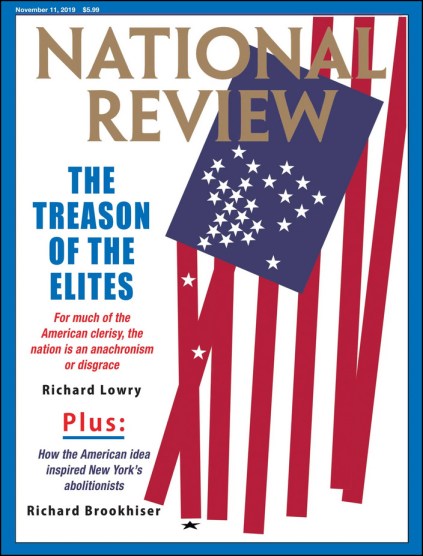
Here is the current cover of National Review:

I’m ashamed to admit that I had to look up the word clerisy, which turns out to mean nothing more than intelligentsia. I guess that’s the price of going to a state university.
Anyway, Lowry’s essay is now available to us non-subscribers, so I read it. It’s mainly about the evolution of historiography in the United States, from old-school scholars who reliably extolled the greatness of our country to modern academics who bemoan the way we’ve treated blacks and native Americans and the poor and so forth. Lowry’s essay begins, predictably enough, with the usual conservative grumbling about Howard Zinn’s A People’s History of the United States—a book I should read someday, I suppose—which has sold 2 million copies during its existence. This amounts to about 50,000 copies a year, giving it an Amazon ranking of #2,639 in the US history category at the moment. This doesn’t strike me as a mortal threat to American exceptionalism, but I suppose your mileage may vary.
This is followed by a brief potted history of how historians have treated US history over the past couple of centuries, climaxing with modern academics and their obsession with identity politics and the depredations of the rich and white against the poor and black:
What historic challenges do the race, gender, and class obsessions of American historiographers prepare us for today? To win a campaign against heteronormativity? To beat ourselves up endlessly and dethrone historical figure after historical figure over white privilege? To be constantly watchful for the baleful effects of toxic masculinity?
An anti-national history is, on top of everything, profoundly ungrateful. It fails to credit our ancestors for achievements on an epic scale. It denies the continuities of our history and our dependence on men and women who didn’t know us but bequeathed us the marvel of America. It runs counter to the inscription that John Adams wrote on the tombstone of his forebear Henry Adams: “This stone and several others have been placed in this yard, by a great great grandson from a veneration of the piety, humility, simplicity, prudence, patience, temperance, frugality, industry and perseverance of his Ancestors, in hopes of recommending an imitation of their virtues to their Posterity.”
I would sympathize more with this attitude if not for the fact that I have, personally, never read a popular history of the United States that took this anti-American attitude. Perhaps it’s common in academic monographs used by critical theory professors, but I have no particular evidence of that and Lowry doesn’t provide any. In any case, it certainly doesn’t seem to have seeped very far outside of academia, where history books and history channels and historical dramas mostly still seem to agree that America is a helluva place.
But all of this is just preface to the main thing that struck me about Lowry’s essay: nowhere does it display any interest in actual historical truth. On the contrary, he approvingly quotes William H. McNeill’s conviction that “believable myths” are necessary to public action. Maybe so—but surely America is not such a horrible place that a fair reading of its history will cause us all to drift into a fatal stagnation?
One can, obviously, disagree about how important some particular facet of American history is, but modern histories are almost unanimously superior to older tomes that suggested slavery wasn’t so bad; ignored the genocide of native Americans; pretended women didn’t exist; and portrayed the robber barons as noble titans of industry. As a matter of simple historical truth, surely most modern histories are, in fact, more accurate than the books of our parents’ childhoods that Lowry seems to favor?
Howard Zinn’s #2,639 ranking on Amazon.com doesn’t worry me. What does worry me is an ignorant nationalism that can be unleashed seemingly at will by conservative politicians who want to wage yet another dumb war or win power on the backs of racism and xenophobia. Right now that mindless form of nationalism is, quite clearly, still ascendant in Donald Trump’s America, and it’s a genuine danger. Anyone who genuinely opposes Trump—as Lowry claims to—really ought to be able to see that.















